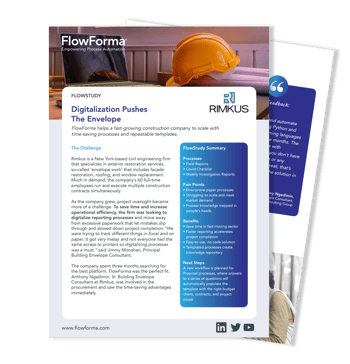FlowForma helps a fast-growing construction company to scale with time-saving processes and repeatable templates
The Processes:
The Pain Points:
The Benefits:
The Next Steps:
A new workflow is planned for Proposal processes, where answers to a series of questions will automatically populate the template with the right budget charts, contracts, and project scope

"I used to try and automate processes using Python and other programming languages and it could take months. The logic is still there with FlowForma Process Automation, but you don’t have to learn any code or any syntax, which is great - that’s what drew us to the solution in the first place!"
Efficiency and productivity are really important because construction is such a fast-paced business. The faster we can get reports out, the happier the clients and the more projects we can take on."
 Rimkus Consulting Group is a civil engineering firm that specializes in exterior restoration services, so-called ‘envelope work’ that includes facade restoration, roofing, and window replacement. Much in demand, the company’s employees run and execute multiple construction contracts simultaneously.
Rimkus Consulting Group is a civil engineering firm that specializes in exterior restoration services, so-called ‘envelope work’ that includes facade restoration, roofing, and window replacement. Much in demand, the company’s employees run and execute multiple construction contracts simultaneously.
As the company grew, project oversight became more of a challenge. To save time and increase operational efficiency, the firm was looking to digitize reporting processes and move away from excessive paperwork that let mistakes slip through and slowed down project completion. “We were trying to track different things in Excel and on paper. It got very messy and not everyone had the same access to printers so digitizing processes was a must,” said Jimmy Monahan, Principal Building Envelope Consultant.
The company spent three months researching the best platform. FlowForma was the perfect fit. Anthony Ngadimin, Sr. Building Envelope Consultant was involved in the procurement and saw the time-saving advantages immediately. “I used to try and automate processes using Python and other programming languages and it could take months. The logic is still there with FlowForma, but you don’t have to learn any code or any syntax, which is great,” he said. “That’s what drew us to the solution in the first place.”
Rimkus’s first ‘flow’ was a Covid Checklist, a form for ensuring employees were safe to work during the pandemic. It was beta tested with employees of varying degrees of tech-savviness, which gave everyone an opportunity to familiarize themselves with the look and feel of the software and ask questions. The feedback loop triggered tweaks and adjustments before moving on to a more sophisticated process.
Field Reports was next, a flow used to provide a detailed record of site visits. Previously, punch lists, bills of quantities, and costs were assembled along with site photographs on handheld devices. Reports were created using different types of documents, culminating in a PDF with handwritten notes. The process was digitized as a templated form with all inputs residing in one place.
The Field Report also provided the structure for Weekly Investigation Reports, used for updates and project milestones or for more granular reporting on specialist areas, like a roof survey. Having a templated approach halves the time it takes to come up with new reports, according to Jimmy Monahan. The Covid Checklist was created in less than a day; the more complicated Field Report in just under a week.
Rolling out FlowForma to new users took the company a quarter of the time it took to deploy other solutions and the outcomes have been game-changing. Monahan described how it is much easier to review processes and train people on them; how everything is in one place with seamless document control, as opposed to old processes where there could be multiple versions in different places.
“Tracking changes is much easier than trying to write them on a PDF, and we don’t have to have administrators making the same change repeatedly. You make it once in the master template and it’s applied to all your other reports,” he said
The Outcome

The time-saving benefits for the business cannot be underestimated. “Efficiency and productivity are really important because construction is such a fast-paced business,” said Anthony Ngadimin.“The faster we can get reports out, the happier the clients and the more projects we can take on.”
Project review processes are completed in half the time – one day as opposed to two – and help catch problems before they become an issue. “We’re doing more at the front end, like uploading site photographs straight into FlowForma. Huge time-saving leads to cost savings, and that allows us to take on almost twice as many deliverables as we normally would,” said Jimmy Monahan
Like a lot of organizations, Rimkus is now rethinking its processes. It has succeeded in its plan to reduce paperwork in the business and is using digitization to do things differently. Crucially, FlowForma has enabled it to scale and meet increasing market demand.
The company had grown too big for processes to exist in a handful of people’s heads. FlowForma has helped create a knowledge repository, where templates provide a repeatable way of doing things that don’t have to be constantly taught and relearned. Jimmy explains ‘‘When you scale when people are working remotely and can’t easily relay information to teammates, there’s a risk people will do things differently. Digitizing in FlowForma has solved that by creating a centralized repository. It means we’re not constantly reinventing the wheel.”
1-2-1 Expert Support | Customized Trial | No Credit Card